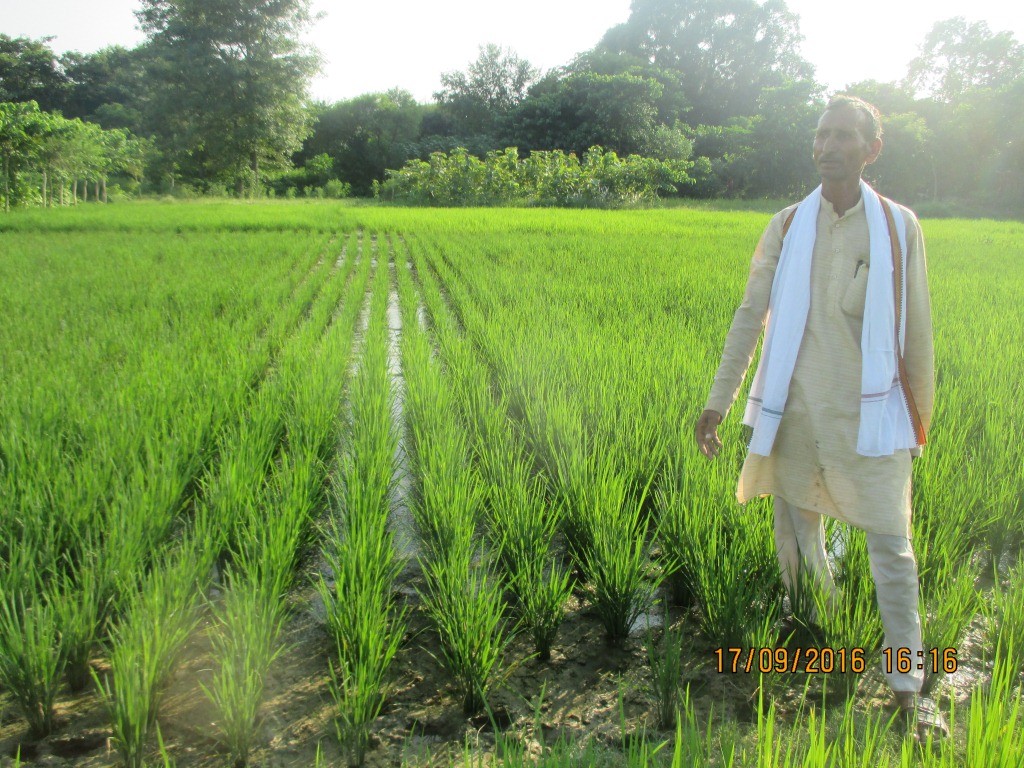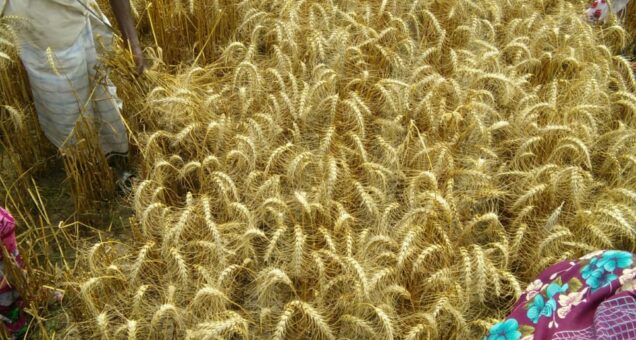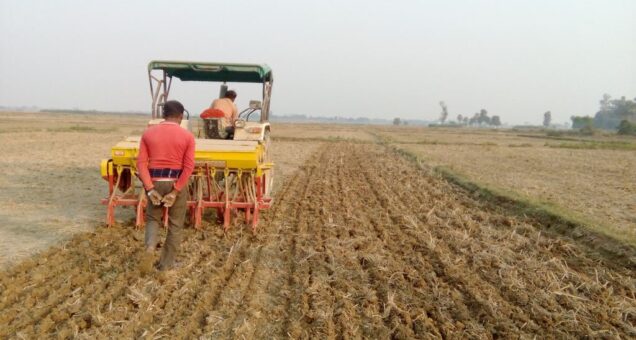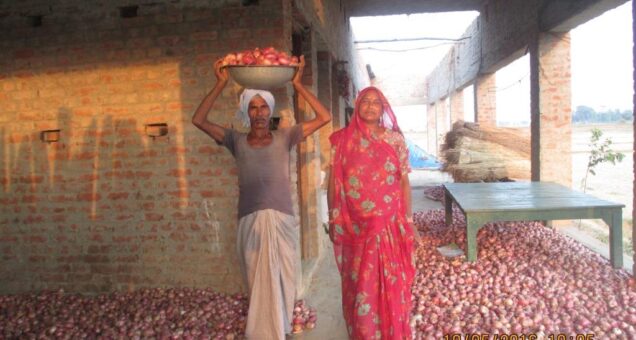Farmers’ Action for Sustainable Agro-based Livelihood (FASAL)
The Farmers’ Action for Sustainable Agro-based Livelihood (FASAL) project, implemented by Swabhiman Samiti, aimed to uplift marginalized farming communities in the flood-prone villages of Ajagara and Hathiwar Tal, located in Uska Bazar Block, Siddharthnagar. With a focus on sustainable agricultural practices, the project targeted 534 farming families, improving their livelihoods, enhancing agricultural productivity, and reducing migration through capacity-building and community mobilization.
Key Highlights:
- Target Area: 12 villages across 2 gram panchayats with a population of 4,243 individuals.
- Land Coverage: 616 acres of land improved with sustainable agricultural practices, including flood-prone and sodic areas.
- Self-Help Groups (SHGs): 23 SHGs formed, engaging 534 families in collective action.









Project Details
- Project Name:
- Farmer’s Action for Sustainable Agro-based Livelihood (FASAL)
- Thematic Area:
- Agriculture, Livelihood
- Outcome:
- Improved agricultural productivity, diversified incomes, and sustainable farming practices for 534 marginal farming households.
Funded By
- Funder Name:
- Sir Dorabji Tata Trust (SDTT), Mumbai
- Implementing Body:
- Swabhiman Samiti
Implemented By
Work Place
- Place of Work:
- Uska Bazar Block, Siddharthnagar, Uttar Pradesh, India
- Year:
- 2012 - 2015
The Farmers’ Action for Sustainable Agro-based Livelihood (FASAL) project was an initiative by Swabhiman Samiti, implemented in the flood-prone villages of Ajagara and Hathiwar Tal under Uska Bazar Block, Siddharthnagar. The project aimed to uplift marginalized farming communities through the adoption of sustainable agricultural practices and diversification of livelihoods. By providing targeted support over three years, the project positively impacted the lives of 534 farming families, ultimately improving their agricultural output and economic resilience.
Objectives:
The main objectives of the FASAL project were:
- Improving Livelihoods: Enhance the economic conditions of marginalized farmers by introducing sustainable agricultural practices that increase productivity and ensure food security.
- Increasing Agricultural Productivity: Promote modern farming techniques to improve yields and conserve natural resources, especially in flood-prone and sodic lands.
- Empowering Farmers: Build the capacity of local farmers to access government schemes, foster self-reliance, and establish strong community networks to ensure continued growth.
Background and Rationale:
The project was implemented in Ajagara and Hathiwar Tal, two villages located within the flood-prone regions of Rapti, Budhi Rapti, and Kura rivers, known for recurring floods that cause extensive agricultural damage and soil erosion. Farmers in these regions face severe challenges with small landholdings, poor irrigation, and inefficient farming techniques, restricting them to only one rain-fed crop annually. High migration rates, poor livestock productivity, and low awareness of government schemes further exacerbated their economic struggles. The FASAL project sought to address these persistent issues and help farmers transition towards more sustainable and profitable farming practices.
Planned Outreach:
The FASAL project aimed to reach:
- Families covered: 534 farming families across 12 villages under 2 gram panchayats in the Uska Bazar Block.
- Target Area: The project covered a total area of 616 acres of agricultural land, including sodic and flood-prone lands.
- Community Involvement: 23 Self-Help Groups (SHGs) were formed, involving 317 families in collective action, resource-sharing, and decision-making.
Key Strategies:
To achieve its objectives, the project employed a combination of strategies aimed at addressing the diverse challenges faced by farmers:
- Community Mobilization: Formation of SHGs to foster collective decision-making and community-driven development.
- Capacity Building: Providing extensive training to farmers on advanced agricultural techniques such as System of Rice Intensification (SRI) and Integrated Plant Nutrient Management (IPNM).
- Infrastructure Support: Introduction of essential irrigation systems, including delivery and suction pipes, to ensure water availability throughout the growing season.
- Promoting Sustainable Practices: Encouraging the use of bio-compost, green manure, and bio-pesticides to improve soil health and reduce reliance on chemical inputs.
- Livelihood Diversification: Expanding beyond traditional crop cultivation to include vegetable farming, poultry farming, and post-harvest management.





Core Activities:
Key activities under the FASAL project included:
- Formation of SHGs: Establishing 23 SHGs to organize farmers and facilitate training, savings, and collective action.
- Training and Workshops: Regular sessions to train farmers on modern farming techniques and business practices.
- Demonstration Plots: Establishing model farms to showcase best agricultural practices, including the System of Rice Intensification (SRI) and vegetable farming under low-tunnel polyhouses.
- Improvement of Livestock: Conducting vaccination camps and training for livestock care and management.
- Post-Harvest Management: Educating farmers on how to reduce losses during harvest and improve market access through zero-energy cool chambers for storage.
Achievements and Outcomes:
The FASAL project achieved several significant outcomes:
- Cultivation Area Expansion: 50 additional acres were dedicated to Kharif crops, and 75 acres were expanded for vegetable cultivation, improving the region’s agricultural productivity.
- Adoption of Modern Techniques: 80% of farmers adopted modern farming techniques, significantly boosting crop yields and improving resource management.
- Increased Family Incomes: Family incomes grew by 25% on average, contributing to a reduction in migration rates as farmers were able to sustain themselves locally.
- Formation of SHGs: 23 SHGs empowered 317 families, promoting self-reliance and collective decision-making.
- Improved Irrigation and Livelihoods: Farmers gained access to subsidized irrigation systems, government schemes, and better livestock management programs.
Conclusion:
The FASAL Project successfully addressed the challenges faced by farmers in Ajagara and Hathiwar Tal, leading to a sustainable increase in agricultural productivity, enhanced livelihoods, and reduced migration rates. By promoting innovative agricultural techniques and supporting farmers with necessary infrastructure and training, the project empowered communities and set a strong foundation for long-term development. The creation of self-help groups (SHGs) and community-based federations ensures that the project’s benefits will continue to be leveraged even after its completion. The success of the FASAL project serves as a replicable model for rural development in flood-prone areas, offering a pathway to improved socio-economic conditions for marginalized farming communities. Swabhiman Samiti remains committed to expanding its efforts and furthering its impact on agricultural and community development.

